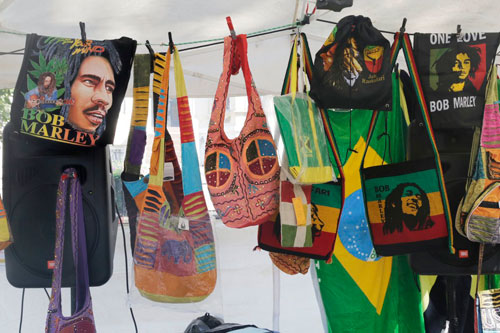Thinking about using a photo of Bob Marley to decorate a T-shirt?
Think again.
If you do, the heirs to the reggae king could legally haul you into court and slap you with a hefty fine.
They recently won the right to do just that.
Recently, the 9th Circuit Court of Appeals ruled in their favor making it illegal for individuals and merchandisers to use the image of the Jamaican, Rastafarian icon without permission.
Marley’s heirs are behind a company called Fifty-Six Hope Road Music — which controls the late reggae star’s likeness for licensing endeavors.
Six years ago, the company sued A.V.E.L.A. and others for using Marley photographs in merchandise sold at Target, Walmart and other large retailers.
Three years later, the plaintiff prevailed at trial on a Lanham Act claim that the merchandisers confused the origin of their goods. The defendants were ordered to disgorge more than $750,000 in profits. Additionally, A.V.E.L.A. had to pay an additional $300,000 in damages for interfering with the official licensing of Marley merchandise, and all the defendants were ordered to remit nearly $1.52 million more in attorney fees.
“This case presents a question that is familiar in our circuit,” 9th Circuit Judge N. Randy Smith said.
“When does the use of a celebrity’s likeness or persona in connection with a product constitute false endorsement that is actionable under the Lanham Act?”
A.V.E.L.A. threw up various objections, but perhaps the one most notable was that the judgment overextended a false endorsement claim by creating a federal right of publicity.
“State publicity right claims protect a plaintiff when the defendant uses the plaintiff’s identity for commercial advantage, without permission,” Judge Smith explained. “However, (Lanham Act) claims require an additional element — that the use be likely to confuse as to the sponsorship or approval of a defendant’s goods.”
A.V.E.L.A. argued that consumers would always “associate a deceased celebrity’s image with that of his or her estate,” but Judge Smith responded that plaintiffs only succeed if they “show more than mere association.”
In analyzing consumers’ likelihood of confusion in celebrity cases, courts are supposed to weigh factors such as the level of recognition of a celebrity, the relatedness of the fame of the celebrity to the defendant’s product, the marketing channels used and the defendant’s intent on selecting the celebrity.
Another factor is evidence of actual confusion on the part of consumers.
In this dispute, allegedly, the plaintiffs conducted a survey of 509 individuals at shopping malls. The interviewees were shown an actual A.V.E.L.A. T-shirt bearing Marley’s image and were asked, “Who do you think gave their permission or approval for this particular T-shirt to be made or put out?” The interviewees were also shown a T-shirt of an unrenowned African-American man with dreadlocks and were asked the same question.
When shown the Marley T-shirt, 37 percent answered Marley or his heirs gave permission. When shown the other T-shirt, the number dropped to 20 percent. Some of the respondents opined the law required permission from the person whose image appeared on the shirt.
That’s not always true, but according to Judge Smith, “Drawing all reasonable inferences in plaintiffs’ favor, the survey shows actual confusion.”
“Evidence of actual confusion is relevant to likelihood of confusion but not required in a false endorsement case,” the judge added,
In addition, 9th Circuit Judge Morgan Christen agreed with the reasoning why the jury’s award was proper but addressed the issue of actual confusion.
In fact, she said consumers might not care who endorsed the shirt.
“Where a celebrity image is itself the only indication of sponsorship, I would hold that a finding of actual confusion … must be supported by some evidence that the confusion could have had an impact on the consumers’ purchasing decisions.”
Celebrities have long struggled with infringement suits.
With variance in many countries with regard to international property laws throughout the world, exploitation related to branding remains an unresolved issue for superstars the likes of Prince, Elvis Presley, Jimmy Hendryx, Tupac Shakur, Michael Jackson, Richard Pryor and even former revolutionary Che Guevarra.
In a similar decision Rihanna won a two-year, multi-million dollar legal battle with Topshop, a British department store, after they unlawfully used her image on a popular T-shirt sold to thousands of fans.
According to The Hollywood Reporter, an entertainment publication that first published both rulings, Rihanna and Sir Phillip Green, the owner of the Topshop outlet are allegedly friendly — reportedly, his daughter Chloe vacationed with the pop singer in Barbados Christmas 2011 — the singer’s legal team proceeded with the suit arguing that she did not give permission to Topshop to use her likeness on merchandise sold at the popular department store.
Earlier this year, Britain’s Court of Appeal upheld the ban agreeing that marketing the clothing without the 26-year-old singer’s approval amounts to ‘passing off,’ a term used to enforce unregistered trademark rights.
“Many of her fans regard her endorsement as important for she is their style icon, and they would buy the t-shirt thinking that she had approved and authorized it.”
“In short, the judge found that the sale of this t-shirt bearing this image amounted to a representation that Rihanna had endorsed it.”

























